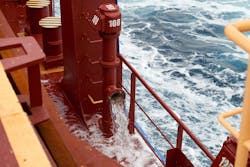EU, Dutch funds invest in portable ballast water treatment solution for emerging economies
Climate Investor Two has approved an investment that could amount to 24.5 million euros ($29.2 million) to support the lease of Damen’s portable ballast water treatment solution InvaSave to customers in Africa, Asia, and Latin America.
Climate Investor Two (CI2) is a financing facility mandated to invest in water, sanitation and ocean infrastructure projects in emerging economies. It enjoys cornerstone support from the EU and the Dutch Fund for Climate and Development (DFCD). The consortium that manages the DFCD also includes World Wide Fund for Nature Netherlands (WWF-NL), Netherlands Development Organization (SNV) and Entrepreneurial Development Bank, FMO.
Climate Fund Managers, the manager of CI2, is pleased to announce the signing of this development funding agreement of 2.8 million euro ($3.3 million) to finance the start of this project with Damen Financial Services, the newly founded department within Damen Shipyards Group.
The project concerns the treatment of ballast water, which is taken on in great quantities by marine vessels to offset unloaded cargo or waste, before being discharged at the ships next port of call. This discharge typically contains a multitude of viruses, bacteria, and other biological materials, including plants and animals collectively referred to as invasive species. The inadvertent release of non-native and nuisance species in ballast water has already triggered extensive ecological damage, with a knock-on effect on the economy and human health.
The International Convention for the Control and Management of Ships' Ballast Water and Sediments (BWM) came into force in 2017, with the goal of ending the spread of harmful aquatic organisms from one region to another. As of July 2020, 87 out of 217 countries have signed the higher standards and procedures for the management of ships' ballast water, representing more than 80 percent of the worlds merchant shipping tonnage.
